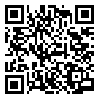1- Department of Medical Education, School of Medicine Kurdistan University of Medical Sciences. https://orcid.org/0000-0001-9311-0038
2- 2- Research Center for Environmental Determinants of Health (RCEDH), Health Institute, Kermanshah University of Medical Sciences, Kermanshah, Iran ,ysafari79@yahoo.com
3- Department of Health Education and Promotion, Health Faculty, KUMS, Kermanshah, Iran
4- 4- Research Center for Environmental Determinants of Health (RCEDH), Health Institute, Kermanshah University of Medical Sciences, Kermanshah, Iran
2- 2- Research Center for Environmental Determinants of Health (RCEDH), Health Institute, Kermanshah University of Medical Sciences, Kermanshah, Iran ,
3- Department of Health Education and Promotion, Health Faculty, KUMS, Kermanshah, Iran
4- 4- Research Center for Environmental Determinants of Health (RCEDH), Health Institute, Kermanshah University of Medical Sciences, Kermanshah, Iran
Abstract: (7 Views)
Background & Objective: Role modeling by physicians plays a key role in shaping the professional competencies, values, and attitudes of medical students. It is particularly significant for students in clinical education settings. This phenomenological study aimed to elucidate the role of the hidden curriculum in modeling professional ethics by examining the experiences of medical students at Kermanshah University of Medical Sciences.
Material & Methods: A qualitative approach utilizing a phenomenological method was conducted with a purposive sample of 12 final-year medical students from Kermanshah University of Medical Sciences during their internship period. The data collection method was a semi-structured interview. The mean duration of each interview was 75 minutes. Data interpretation was performed using Colaizzi's seven-step approach.
Results: Overall, six main themes emerged from the data, which include (1) Modeling professional ethics directly and indirectly through the training and behavior of professors, (2) Modeling professional ethics from societal influences and non-professional interactions with professors, (3) Modeling positive or negative professional ethics based on external circumstances (4) Motivation for students to emulate professional ethics (5) Beliefs in possessing inherent abilities to model professional ethics (6) Characteristics of professors as models of professional ethics.
Conclusions: According to the results of this study, students play a significant role in modeling for professors the importance of acquiring professional ethics. This involves improving educational conditions, encouraging teachers to be mindful of their behavior in clinical environments, and creating suitable modeling opportunities. Additionally, it is recommended to increase the number of professors who can serve as role models in professional ethics.
Material & Methods: A qualitative approach utilizing a phenomenological method was conducted with a purposive sample of 12 final-year medical students from Kermanshah University of Medical Sciences during their internship period. The data collection method was a semi-structured interview. The mean duration of each interview was 75 minutes. Data interpretation was performed using Colaizzi's seven-step approach.
Results: Overall, six main themes emerged from the data, which include (1) Modeling professional ethics directly and indirectly through the training and behavior of professors, (2) Modeling professional ethics from societal influences and non-professional interactions with professors, (3) Modeling positive or negative professional ethics based on external circumstances (4) Motivation for students to emulate professional ethics (5) Beliefs in possessing inherent abilities to model professional ethics (6) Characteristics of professors as models of professional ethics.
Conclusions: According to the results of this study, students play a significant role in modeling for professors the importance of acquiring professional ethics. This involves improving educational conditions, encouraging teachers to be mindful of their behavior in clinical environments, and creating suitable modeling opportunities. Additionally, it is recommended to increase the number of professors who can serve as role models in professional ethics.
Article Type : Orginal Research |
Subject:
Medical Education
Received: 2024/12/27 | Accepted: 2025/06/23
Received: 2024/12/27 | Accepted: 2025/06/23
Send email to the article author
| Rights and permissions | |
 |
This work is licensed under a Creative Commons Attribution-NonCommercial 4.0 International License. |



